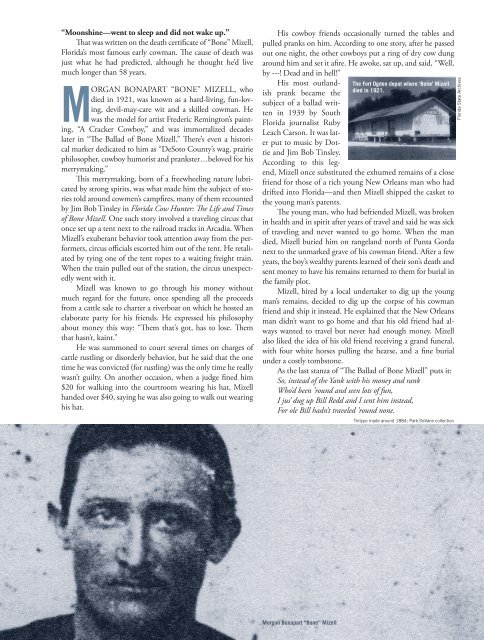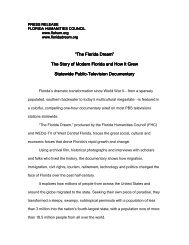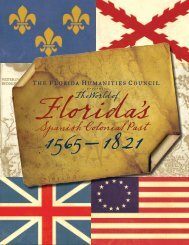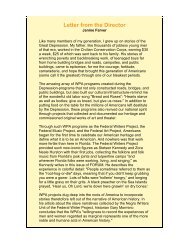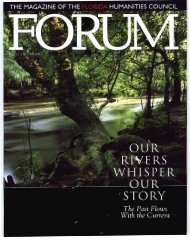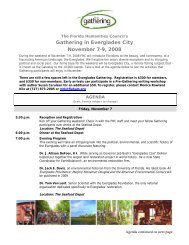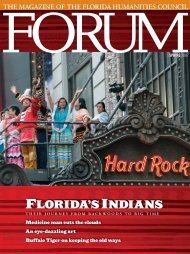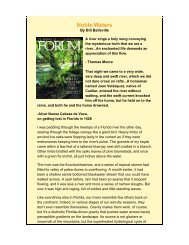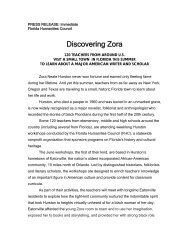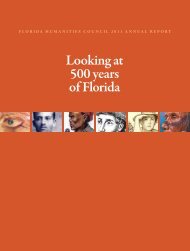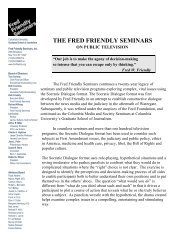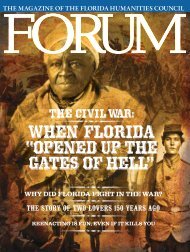THE MAGAZINE OF THE FLORIDA HUMANITIES COUNCIL
THE MAGAZINE OF THE FLORIDA HUMANITIES COUNCIL
THE MAGAZINE OF THE FLORIDA HUMANITIES COUNCIL
You also want an ePaper? Increase the reach of your titles
YUMPU automatically turns print PDFs into web optimized ePapers that Google loves.
“moonshine—went to sleep and did not wake up.”<br />
That was written on the death certificate of “Bone” Mizell,<br />
Florida’s most famous early cowman. The cause of death was<br />
just what he had predicted, although he thought he’d live<br />
much longer than 58 years.<br />
MORGAN BONAPART “BONE” MIZELL, who<br />
died in 1921, was known as a hard-living, fun-loving,<br />
devil-may-care wit and a skilled cowman. He<br />
was the model for artist Frederic Remington’s painting,<br />
“A Cracker Cowboy,” and was immortalized decades<br />
later in “The Ballad of Bone Mizell.” There’s even a historical<br />
marker dedicated to him as “DeSoto County’s wag, prairie<br />
philosopher, cowboy humorist and prankster…beloved for his<br />
merrymaking.”<br />
This merrymaking, born of a freewheeling nature lubricated<br />
by strong spirits, was what made him the subject of stories<br />
told around cowmen’s campfires, many of them recounted<br />
by Jim Bob Tinsley in Florida Cow Hunter: The Life and Times<br />
of Bone Mizell. One such story involved a traveling circus that<br />
once set up a tent next to the railroad tracks in Arcadia. When<br />
Mizell’s exuberant behavior took attention away from the performers,<br />
circus officials escorted him out of the tent. He retaliated<br />
by tying one of the tent ropes to a waiting freight train.<br />
When the train pulled out of the station, the circus unexpectedly<br />
went with it.<br />
Mizell was known to go through his money without<br />
much regard for the future, once spending all the proceeds<br />
from a cattle sale to charter a riverboat on which he hosted an<br />
elaborate party for his friends. He expressed his philosophy<br />
about money this way: “Them that’s got, has to lose. Them<br />
that hasn’t, kaint.”<br />
He was summoned to court several times on charges of<br />
cattle rustling or disorderly behavior, but he said that the one<br />
time he was convicted (for rustling) was the only time he really<br />
wasn’t guilty. On another occasion, when a judge fined him<br />
$20 for walking into the courtroom wearing his hat, Mizell<br />
handed over $40, saying he was also going to walk out wearing<br />
his hat.<br />
His cowboy friends occasionally turned the tables and<br />
pulled pranks on him. According to one story, after he passed<br />
out one night, the other cowboys put a ring of dry cow dung<br />
around him and set it afire. He awoke, sat up, and said, “Well,<br />
by ---! Dead and in hell!”<br />
His most outlandish<br />
prank became the<br />
subject of a ballad written<br />
in 1939 by South<br />
Florida journalist Ruby<br />
Leach Carson. It was later<br />
put to music by Dottie<br />
and Jim Bob Tinsley.<br />
According to this leg-<br />
The Fort Ogden depot where ‘Bone’ Mizell<br />
died in 1921.<br />
end, Mizell once substituted the exhumed remains of a close<br />
friend for those of a rich young New Orleans man who had<br />
drifted into Florida—and then Mizell shipped the casket to<br />
the young man’s parents.<br />
The young man, who had befriended Mizell, was broken<br />
in health and in spirit after years of travel and said he was sick<br />
of traveling and never wanted to go home. When the man<br />
died, Mizell buried him on rangeland north of Punta Gorda<br />
next to the unmarked grave of his cowman friend. After a few<br />
years, the boy’s wealthy parents learned of their son’s death and<br />
sent money to have his remains returned to them for burial in<br />
the family plot.<br />
Mizell, hired by a local undertaker to dig up the young<br />
man’s remains, decided to dig up the corpse of his cowman<br />
friend and ship it instead. He explained that the New Orleans<br />
man didn’t want to go home and that his old friend had always<br />
wanted to travel but never had enough money. Mizell<br />
also liked the idea of his old friend receiving a grand funeral,<br />
with four white horses pulling the hearse, and a fine burial<br />
under a costly tombstone.<br />
As the last stanza of “The Ballad of Bone Mizell” puts it:<br />
So, instead of the Yank with his money and rank<br />
Who’d been ’round and seen lots of fun,<br />
I jus’ dug up Bill Redd and I sent him instead,<br />
For ole Bill hadn’t traveled ’round none.<br />
Morgan Bonapart “Bone” Mizell<br />
Tintype made around 1884; Park DeVane collection<br />
Florida State Archives


